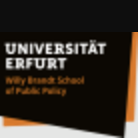Introduction
The Willy Brandt School of Public Policy is a school located in Erfurt, Germany, focusing on the field of public policy. It provides students with high-quality public policy education, cultivates talents with professional knowledge and practical ability in this field, and plays an important role in promoting public policy research and practice.
Overview
Student size: The number of students is moderate, attracting students from all over the world, including many international students. This diverse student group helps to create a learning atmosphere of cross-cultural communication.
Course settings: Master's degree programs are offered, such as the Master of Public Policy (MPP). The course content covers a number of public policy-related fields such as public administration, policy analysis, international cooperation, and sustainable development. Through theoretical teaching, case studies, practical projects and other methods, students can fully master public policy knowledge and skills.
History and establishment time
The school was founded in 2002 and named after former German Chancellor Willy Brandt. It has a relatively new but vibrant development history.
School strength
Faculty: It has a team of highly qualified teachers who come from different academic backgrounds and professional fields, including political science, economics, sociology, etc. Many teachers not only have fruitful academic research results, but also have rich experience in public policy practice, and can provide students with in-depth theoretical knowledge explanations and practical case analysis.
Teaching resources: Establish cooperative relationships with many international organizations, government agencies, non-governmental organizations, etc., to provide students with rich internship and practice opportunities. The school is also equipped with modern teaching facilities, including libraries, computer laboratories, etc., to meet students' learning and research needs.
Nature of the institution
It is a public school affiliated to the University of Erfurt, and has certain professionalism and authority in the field of public policy education.
Educational philosophy
Emphasis on interdisciplinary learning methods, integrating knowledge from multiple disciplines such as political science, economics, and sociology into the teaching of public policy, and cultivating students' ability to comprehensively analyze and solve complex public policy problems.
Focus on practice orientation, encourage students to participate in the actual policy formulation and implementation process, and enable students to apply theoretical knowledge to practical work through practical projects, internships, etc., to enhance students' practical operation ability in the field of public policy.
Adhering to an international perspective, in view of the global nature of public policy issues, cultivate students' ability to understand and respond to transnational public policy challenges, and promote international public policy exchanges and cooperation.
Key laboratories and disciplines
Key disciplines: Public policy is the core discipline of the school, focusing on international public policy, social policy, environmental policy and other directions. In the field of international public policy, transnational issues such as global governance and international cooperation mechanisms are studied; social policy involves social equity, welfare system and other contents; environmental policy focuses on hot issues such as sustainable development and climate change response.
Key laboratories or research centers: Although there may not be laboratories in the traditional sense, the school has some research centers, such as the International Cooperation and Development Research Center, which conduct cutting-edge research related to public policy, provide theoretical support for teaching, and also provide a platform for students to participate in scientific research projects.
Department
The school has not clearly divided the department, and mainly carries out teaching and research activities around the core field of public policy, including theoretical research on public policy, policy analysis methods, and policy practice in different fields.
Ranking
It has a certain performance in the school rankings in the field of public policy. It ranks relatively high in the ranking of public policy-related majors in Germany, and is gradually recognized in Europe. The specific ranking will vary depending on the ranking agency and evaluation criteria.
Fees
Tuition fees: For EU students, tuition fees are relatively low or may be free of charge according to the policy of German public schools; for non-EU students, tuition fees may be slightly higher, and the specific amount varies depending on the course and specific regulations, generally within a certain amount per semester (the specific amount may be adjusted according to school policy).
Other expenses: Students also need to consider living expenses, including accommodation, food, books and learning materials. The cost of living in Erfurt is relatively low compared to some large cities in Germany, and students can reasonably arrange living expenses according to their own financial situation.
Campus
Geographic location: Located in Erfurt, a city in central Germany, Erfurt is the capital of Thuringia, with a long history and culture and a beautiful urban environment. The school is located in a convenient location, which is convenient for students to communicate and cooperate with local government agencies, social organizations, etc.
Campus facilities: The campus building has a modern style and complete internal facilities. The library has a rich collection of books, covering books and journals in many fields such as public policy, political science, and economics, providing students with sufficient learning resources. The school also has facilities such as conference rooms and seminar rooms to facilitate students to conduct group discussions, academic seminars and other activities. In addition, the computer laboratories on campus are equipped with advanced computer equipment and related software to meet students' needs for information technology in the process of learning and research.
-

Heidelberg University
-

University of Freiburg
-

University of Jena
-

University of Marburg
-

University of Rostock
-

University of Halle-Wittenberg
-

University of Bayreuth
-

Leipzig University
-

University of Tübingen
-

Humboldt University of Berlin
-

Mesoamerican University
-

Istmo University
-

Mariano Galvez University of Guatemala
-

Regional University of Guatemala
-

Galileo University
-

Francisco Marroquín University
-

Rafael Landívar University
-

University of the Valley of Guatemala
-

University of San Carlos of Guatemala
-

Technological Institute of Tlaxcala Plateau
-

Golfo University
-

Technological University of South Sonora
-

Technological University of Huejotzingo
-

Tizimín Institute of Technology
-

Chilpancingo Institute of Technology

